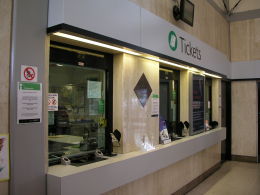Posted 7th May 2013 | No Comments
DfT explains London Midland ticket office closures

THE DEPARTMENT FOR TRANSPORT has been explaining why four London Midland stations are to lose their ticket offices. The DfT has turned down applications to close the offices at five others.
Altogether, the hours of opening are changing at 86 London Midland stations. The details of the controversial decision, first announced by rail minister Norman Baker in September last year, have been explained in the form of 'guidance' rather than a formal press release, and there is no mention of it on the front page of the DfT's website.
The DfT has also attempted to fend off its critics by saying that the changes are the result of applications from London Midland under the rules of the Ticketing and Settlement Agreement, and that the proposal 'only came to the Department to arbitrate because they could not reach agreement with the passenger representative bodies Passenger Focus and London TravelWatch'.
The four stations which are losing their ticket offices are Cheddington, Lye, Witton and Wythall. The DfT has ruled that five others – Adderley Park, Bescot Stadium, Duddeston, Jewellery Quarter and Small Heath – will continue to sell tickets from a staffed office during at least part of the day.
The DfT added that 'a few stations will have their opening hours extended in the mornings or evenings to better match passenger demand', but also said that some offices 'will have reduced opening hours during very quiet periods'. It said that the test of a 'busy' office was one which sells at least 12 tickets an hour.
It has also revealed that reductions in opening hours have been approved since 2010 at more than 35 ticket offices which are managed by other operators, including London Marylebone (Chiltern) and Birmingham New Street (Virgin), although the hours at ten other stations have been extended. These include York (East Coast), Tring (London Midland) and Leamington Spa (Chiltern).
The reforms have been opposed vigorously by rail unions, who have been campaigning against any reductions, but the DfT has denied that there is any connection between the London Midland decision and the recommendations in Sir Roy McNulty's 'value for money' report about the railways.
His report, which was published two years ago this month, concluded that there should be a 'review of many aspects of staffing and working practices'.
